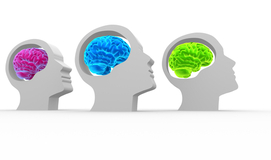Doctoral Psychology Externship Program
ASPIRE Center for Learning and Development is a private outpatient clinic in Melville, NY (on Long Island’s Nassau/Suffolk border) serving clients across the lifespan who have Autism Spectrum Disorder (ASD) and other social learning difficulties (e.g., ADHD, anxiety disorders). The specialized, multidisciplinary services offered at ASPIRE Center are rooted in evidence-based clinical practice that emphasizes individualization and fundamental recognition of neurodevelopmental implications for treatment. Training within this setting provides interested students with the opportunity to develop a diverse skill set in assessment, psychotherapy, group facilitation, consultation, and community programming with this unique population of children, adolescents, and adults.
Detailed information about programming and services provided at ASPIRE Center can be found by exploring the website's menu options on the left sidebar.
Detailed information about programming and services provided at ASPIRE Center can be found by exploring the website's menu options on the left sidebar.
Training Program Structure

Psychology externs are an integral part of ASPIRE Center’s multidisciplinary team and encounter a broad range of clinical experiences throughout the course of the training year. An outline of the core program components is provided below.
Psychotherapy
An ongoing caseload of 2-5 long-term and short-term individual, family, and group therapy clients is strategically assigned to each extern based on his or her primary interests and training goals. Presenting concerns are broad in range (e.g., complex differential diagnosis, comorbid neurodevelopmental and mental health disorders, behavior management, parenting difficulties, social skills, transitions and adjustment) and provide opportunity for advanced training across multiple treatment modalities. In addition to conducting client sessions, professional development in this area entails case conceptualization, treatment planning, clinical record maintenance, coordination with collateral treatment providers, (internal, community-based, and school-based), and application of evidence-based treatment approaches.
Group Facilitation
Externs are responsible for facilitating 2-3 weekly social coping or specialty groups throughout the course of the training year. Depending on prior experience, evidenced proficiency, and individual group structure, trainees may assume the role of primary group leader or co-facilitate with staff clinicians. Groups at ASPIRE Center are available across age ranges, from young children (4-6 years old) to adults. Curricula may be based on manualized treatment or comprised of individualized topics and activities drawn from evidence-based approaches (e.g., CBT, DBT, ACT). The group program is multifaceted and incorporates a careful screening process that matches participants with appropriate peers. Ongoing collaboration with parents is a central component of children’s groups, which is conducted formally through mid-cycle and post-cycle feedback, as well as through generalization activities assigned following each session.
Assessment
Externs participate in approximately 1-2 comprehensive diagnostic evaluations per month as members of our multidisciplinary psychology and speech-language team. Evaluation formats may range from standard psychoeducational or diagnostic procedures to complex differential diagnosis (e.g., ASD, OCD, anxiety, ADHD, depression, language disorders). Administration of gold standard cognitive (WJ-IV Cog, WISC-V/WAIS-IV, Stanford Binet 5, Leiter-3), achievement (WJ-IV Ach, WRAT-4) and diagnostic (ADOS-2, ADI-R) instruments is performed with increasing independence as the training year progresses. Assessment tasks include chart review, evaluation plan development, cognitive and diagnostic test administration, scoring, interpreting findings, attending team meetings, conducting parent feedback sessions, and generating comprehensive written reports. Incoming trainees must possess strong conceptual and procedural understanding of psychological assessment prior to commencing an externship position at ASPIRE Center, since advanced psychological testing skills constitute a primary area of professional development at this placement. Highly developed abilities in composing sections of written reports (i.e., with supervisory input that primarily targets content and interpretation - rather than structure or grammar/mechanics) are essential.
In addition to the core training activities, externs may have the opportunity to engage in additional optional training opportunities, such as:
● Consultation with parents, schools, and community agencies
● Educational and treatment advocacy across ages and ability level
● Scholarly research related to staff projects or in personal areas of interest
● Co-authorship of articles for newsletters, publications, and professional journals
● Co-presentation at local and national trainings and conferences
Psychotherapy
An ongoing caseload of 2-5 long-term and short-term individual, family, and group therapy clients is strategically assigned to each extern based on his or her primary interests and training goals. Presenting concerns are broad in range (e.g., complex differential diagnosis, comorbid neurodevelopmental and mental health disorders, behavior management, parenting difficulties, social skills, transitions and adjustment) and provide opportunity for advanced training across multiple treatment modalities. In addition to conducting client sessions, professional development in this area entails case conceptualization, treatment planning, clinical record maintenance, coordination with collateral treatment providers, (internal, community-based, and school-based), and application of evidence-based treatment approaches.
Group Facilitation
Externs are responsible for facilitating 2-3 weekly social coping or specialty groups throughout the course of the training year. Depending on prior experience, evidenced proficiency, and individual group structure, trainees may assume the role of primary group leader or co-facilitate with staff clinicians. Groups at ASPIRE Center are available across age ranges, from young children (4-6 years old) to adults. Curricula may be based on manualized treatment or comprised of individualized topics and activities drawn from evidence-based approaches (e.g., CBT, DBT, ACT). The group program is multifaceted and incorporates a careful screening process that matches participants with appropriate peers. Ongoing collaboration with parents is a central component of children’s groups, which is conducted formally through mid-cycle and post-cycle feedback, as well as through generalization activities assigned following each session.
Assessment
Externs participate in approximately 1-2 comprehensive diagnostic evaluations per month as members of our multidisciplinary psychology and speech-language team. Evaluation formats may range from standard psychoeducational or diagnostic procedures to complex differential diagnosis (e.g., ASD, OCD, anxiety, ADHD, depression, language disorders). Administration of gold standard cognitive (WJ-IV Cog, WISC-V/WAIS-IV, Stanford Binet 5, Leiter-3), achievement (WJ-IV Ach, WRAT-4) and diagnostic (ADOS-2, ADI-R) instruments is performed with increasing independence as the training year progresses. Assessment tasks include chart review, evaluation plan development, cognitive and diagnostic test administration, scoring, interpreting findings, attending team meetings, conducting parent feedback sessions, and generating comprehensive written reports. Incoming trainees must possess strong conceptual and procedural understanding of psychological assessment prior to commencing an externship position at ASPIRE Center, since advanced psychological testing skills constitute a primary area of professional development at this placement. Highly developed abilities in composing sections of written reports (i.e., with supervisory input that primarily targets content and interpretation - rather than structure or grammar/mechanics) are essential.
In addition to the core training activities, externs may have the opportunity to engage in additional optional training opportunities, such as:
● Consultation with parents, schools, and community agencies
● Educational and treatment advocacy across ages and ability level
● Scholarly research related to staff projects or in personal areas of interest
● Co-authorship of articles for newsletters, publications, and professional journals
● Co-presentation at local and national trainings and conferences
Supervision

Externs receive a minimum of one hour of individual supervision per week with a licensed psychologist, as well as one hour of group supervision per week. Although each extern is assigned a primary supervisor, all supervising clinicians maintain an “open-door” policy to ensure that guidance is consistently available if particularly challenging or urgent clinical issues arise. Advanced externs (in the 3rd or 4th year of their training program) may have the opportunity to co-supervise junior trainees and undergraduate volunteers.
As part of group supervision, twice-monthly case conferences alternate with didactic seminars, during which chief clinicians present on subtopics within their respective areas of expertise. Externs practice providing relevant details and soliciting peer feedback regarding evaluation and treatment cases, as well as contributing to active clinical dialogue. Additionally, each extern selects a topic area, based on professional interest or prior experience, to present to the group at the culmination of the training year.
As part of group supervision, twice-monthly case conferences alternate with didactic seminars, during which chief clinicians present on subtopics within their respective areas of expertise. Externs practice providing relevant details and soliciting peer feedback regarding evaluation and treatment cases, as well as contributing to active clinical dialogue. Additionally, each extern selects a topic area, based on professional interest or prior experience, to present to the group at the culmination of the training year.
Schedule
An externship placement at ASPIRE Center may range in structure from 2-3 days (15-24 hours) per week based on availability, training program requirements, and center needs. Due to the nature of outpatient clinical work and client scheduling, evening availability is essential at this placement. For the 2017-2018 training year, scheduling for individual supervision, group supervision, and evaluation requires that externs are present at the center on Wednesdays from
12-8 PM. Additional hours may be flexible Tuesday-Thursday as determined in advance through collaborative discussion.
In addition to the formal externship program spanning the full academic year, “mini” rotations (3-4 hours per week) may be available for trainees specifically interested in group therapy facilitation (involves 8-10 week commitment).
12-8 PM. Additional hours may be flexible Tuesday-Thursday as determined in advance through collaborative discussion.
In addition to the formal externship program spanning the full academic year, “mini” rotations (3-4 hours per week) may be available for trainees specifically interested in group therapy facilitation (involves 8-10 week commitment).
Stipend
A modest stipend is provided based on weekly clinical hours during the externship year, to be paid in two increments (at the end of each semester). Trainees who are present for 15-19 hours per week receive remuneration of $1500, and those available for at least 20 hours per week receive a $2000 stipend.
Application Instructions

Application materials will be accepted beginning January 17, 2017 per PSYDNYS externship guidelines. Application review and interview notifications will be conducted on a rolling basis, and offers for externship positions will be made no sooner than February 28, 2017 as stipulated by PSYDNYS. ASPIRE Center is offering two externship positions for the 2017-2018 academic year. Additional summer training opportunities (June-August) may be available for externs who wish to extend their training experience or gain experience in a particular clinical area (e.g., group facilitation, evaluation).
Interested applicants should submit:
*One case summary
Application materials should be submitted via electronic (preferred) or postal mail to:
Alyson H. Sheehan, Ph.D.
Clinical Coordinator
Director of Clinical Training
ASPIRE Center for Learning and Development
63 Old East Neck Road
Melville, NY 11747
[email protected]
Please feel free to contact ASPIRE Center via e-mail ([email protected]) with any questions regarding the externship program or application process.
Interested applicants should submit:
- Letter of application indicating specific interests, qualifications, and goals that align with the externship program at ASPIRE Center
- Curriculum vitae
- Current graduate transcript (unofficial is acceptable)
- Two de-identified writing samples:
*One case summary
- Three letters of recommendation
Application materials should be submitted via electronic (preferred) or postal mail to:
Alyson H. Sheehan, Ph.D.
Clinical Coordinator
Director of Clinical Training
ASPIRE Center for Learning and Development
63 Old East Neck Road
Melville, NY 11747
[email protected]
Please feel free to contact ASPIRE Center via e-mail ([email protected]) with any questions regarding the externship program or application process.


